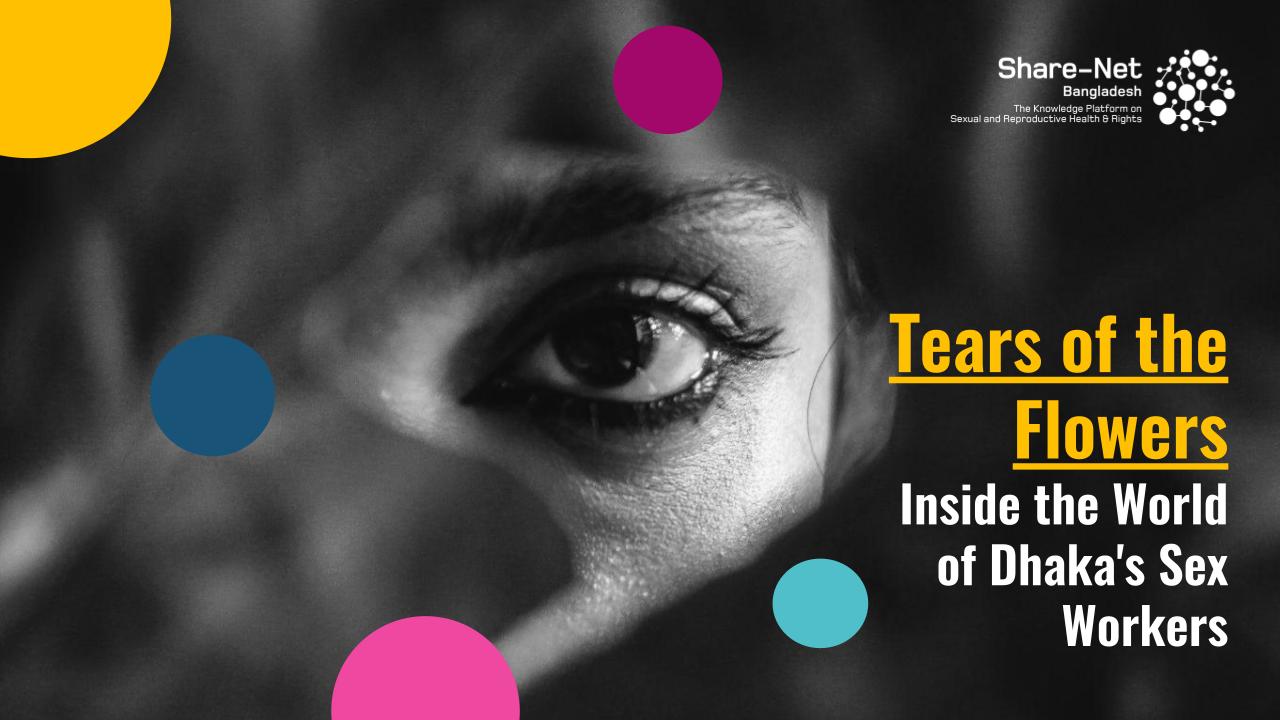Tears of the Flowers: Inside the World of Dhaka’s Sex Workers
In the bustling city of Dhaka, lies a hidden world where women and girls are lured into a life of sex work under false pretences. Brokers, claiming to offer job opportunities, trap them into prostitution, subjecting them to exploitation and blackmail. These sex workers face harrowing challenges, battling discrimination, meagre pay, and violence while trying to survive in a society that often neglects their basic human rights.
One cannot help but wonder: How did they end up in this trade? Why are the brokers so powerful? The stories of Sonali, Reshmi, and Jahanara reveal a grim reality — an underworld where “brother gangs” control the entire system, reducing these women to mere commodities for profit. As a result, sex workers have little autonomy and must accept lump-sum earnings without protest, fearing retribution from the brokers who hold them under their thumb.
While prostitution itself is not banned in Bangladesh, some laws criminalize the exploitation of underage girls for this purpose. Adult women can engage in sex work through a declaration in front of a magistrate and can work in government-registered brothels. However, the absence of brothels in Dhaka and nearby areas has led to a rise in floating sex workers and those linked to hotels. The eviction of large brothels from other regions further exacerbates their vulnerability.
These women often come from disadvantaged backgrounds, manipulated into the profession by deception and coercion. Nasima’s heart-wrenching tale is a glaring example of how vulnerable girls are tricked into this trade by false promises and threats of physical abuse. Unscrupulous brokers build circles of exploited girls, recording videos to ensure compliance, perpetuating the cycle of exploitation.
The plight of Dhaka’s sex workers is further compounded by a stark power imbalance. Clients pay substantial amounts for their services, yet sex workers receive only a fraction of their earnings, with the rest taken by brokers, house or hotel renters, and even the police. This exploitation thrives due to a nexus between brokers and law enforcement, making it difficult for victims to seek justice or break free from the vicious cycle.
The risks to sex workers and customers alike are evident. Customers, lured by visiting cards of “brothers,” are exposed to the risk of muggers or blackmail. For sex workers, dangers lurk in the form of violence, exploitation, and the threat of public exposure. The absence of a safe working environment leaves them vulnerable to abuse and financial loss.
It is imperative to address the urgent need for sex workers’ sexual and reproductive health and rights (SRHR) and human rights. Their dignity and autonomy must be respected, and protection mechanisms should be put in place to shield them from exploitation and abuse. Authorities must collaborate with non-governmental organizations to offer support and safe spaces for sex workers who wish to leave the trade.
The enforcement of existing laws against the exploitation of underage girls and public nuisance must be stringent. Brokers who thrive on the exploitation of vulnerable women must face legal consequences, and police forces must not turn a blind eye to their activities.
Acknowledging the complexities of the issue is crucial. While voluntary entry into sex work may occur, it should not overshadow the urgency of addressing exploitation and protecting those who are forced into the profession against their will. A multi-faceted approach that balances empathy and pragmatism is essential to support the rights and well-being of these women.
As a society, we must strive to provide alternative livelihood opportunities for sex workers, ensuring access to education and vocational training. Only then can we break the chains of exploitation and give these women a chance at a better life, where the dark corners of society no longer bind them.
The stories of Dhaka’s sex workers reveal the urgent need to address the issue of exploitation, abuse, and the denial of their fundamental human rights. By understanding their struggles, we can collectively work towards creating a more inclusive and compassionate society, where every individual’s dignity and well-being are protected, irrespective of their profession or background. It is time to act, to give these women a voice, and to uphold their rights as fellow human beings.
Source: Dhaka Tribune


